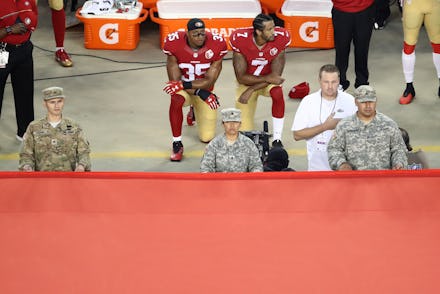Why high school players protesting the national anthem is great patriotism

As Colin Kaepernick's protest of the national anthem spreads to other professional athletes and the high school players who look up to them, one thing is clear: Athletes are feeling more empowered than ever to flex their first amendment muscle before their captive audiences.
What is unique about these displays of patriotism is that they're happening during sporting events, which have long been falsely promoted by media, athletes and deep-pocketed owners as apolitical. But sports have never, ever been apolitical.
Perhaps more than any other professional sports league in the United States, the NFL is filled with symbols of patriotic revelry; the national anthem is just one example. Others include the fighter jets flying above stadiums before games, the occasional broadcast of troops rooting for their favorite teams from war zones and the on-field tributes by military personnel — which reportedly costs the Department of Defense $5.4 million.
Those are perfectly fine and acceptable forms of patriotism but so too are the increasingly urgent calls from athletes like Kaepernick to fix broken politics that endanger the lives of black and brown Americans. Dissent is distinctly American, and what we're seeing now is an unprecedented display of constructive patriotism that's uniting communities that have long been excluded from America's telling of its own triumphant story. However, New York Times columnist David Brooks argues in a new column that high school players' protests are "counterproductive."
"If these common rituals are insulted, other people won't be motivated to right your injustices because they'll be less likely to feel that you are part of their story," Brooks writes. "People will become strangers to one another and will interact in cold instrumentalist terms."
Brooks is wrong. He uses racially coded language to appeal directly to young black protesters: If you stand against racial inequity and state violence, white people won't like you. But when you're being killed by racial inequity and state violence, getting white people to like you is the least of your concerns. What young protesters are learning from their professional role models is that being liked won't keep you alive, but speaking out can hopefully help change the country that's bent on killing you.
Kaepernick's protests, once thought of as a symbol of a bygone political era of politically inclined athletes, have heated up quickly on the high school level. It has awakened the sleeping giant of younger athletes eager to take a stand against the constant stream of news about police brutality in recent years.
The latest example comes from Minneapolis, where on Thursday night the entire Minnesota South High School's girls' volleyball team kneeled during the national anthem. Representatives from Minnesota South High School did not immediately respond to request for comment.
And the list of young protesters grows daily: a black high school football player in Worcester, Massachusetts; a high school football team in San Francisco; high school basketball players in Nebraska; an entire football team in Camden, New Jersey.
Every athlete who chooses not to stand is also taking a risk. For professionals like Denver Broncos linebacker Brandon Marshall, the risk is expensive: He lost a pair of endorsement deals when he took a knee during Denver's opening season game against the Carolina Panthers. For younger athletes, the threat is more personal; the Catholic Diocese of Camden, New Jersey, told CBS News that students who engaged in such protests risked suspension.
"We are not public institutions and free speech in all of its demonstrations, including protests, is not a guaranteed right," superintendent Mary Boyle wrote in a letter to administrators.
But that point is up for debate.
"The highest court in the land ruled long ago, and it's been upheld time after time, that students do not leave their free speech rights at the schoolhouse gate," Bob Farrace, director of public affairs for the National Association of Secondary School Principals, told CBS.
At a time when professional sports are more profitable than ever — the NFL took in a whopping $7.2 billion in revenue in 2014 — student athletes are learning an important lesson from their superstar role models: Freedom of speech is priceless, especially in a climate of widespread political dissent across America.